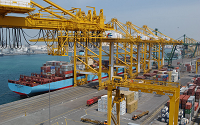Dubai non-oil trade hits Dh652b
By viji Sunday, 01 November 2015 10:11 AM

China, India and US remain emirate's top three trading partners in H1.
Dubai's foreign trade during the first half of 2015 remained stable at Dh652 billion compared to Dh654 billion in the same period last year.
According to latest data issued by Dubai Customs, the emirate's exports registered double-digit growth in exports during the January-June period as it reached Dh65 billion from Dh59 billion in the same period last year.
Dubai's re-exports and imports also sustained high foreign trade figures during the period despite the turmoil across global markets due to the deflation in oil and commodity prices as well as the fluctuation in the exchange rates of major global currencies.
The emirate's first-half imports fell 1.47 per cent to Dh402 billion while year-on-year re-exports dropped by 1.06 per cent at Dh185 billion. Phones and automobiles contributed the lion's share in total non-oil foreign trade with Dh95 billion and Dh35 billion worth of transactions, respectively.
Sultan Ahmed bin Sulayem, chairman of DP World and chairman of Ports, Customs and Free Zone Corporation, said that these figures reflect robust trade ties, which are growing by the day, between Dubai and major global economies.
"Dubai has shown it is strong enough to withstand the global economic turmoil, relying on innovative work systems, long-standing expertise and know-how, highly-skilled workforce and advanced infrastructure for telecommunication, transport, freight and logistics," Bin Sulayem said.
China led the list of Dubai's top trading partners, with a total bilateral trade volume of Dh90 billion in the first half of 2015. It was followed by India and United States at Dh50 billion and Dh39.3 billion, respectively. Saudi Arabia was the fourth global and top Arab trading partner of Dubai at Dh32.2 billion.
"The flexibility and diversity of Dubai's trade as well as its ability to make inroads into new markets have all had a positive impact on the competitiveness of the UAE in general and Dubai in particular," Bin Sulayem added.
Atik Munshi, managing partner at Horwath Mak, said the reduction in oil prices has forced the gulf economies to focus more on non-oil sector and UAE is no exception. "It is anticipated that non-oil sector will have increasing importance for Dubai and UAE in the years to come. Trade with conventional partners like China and India is expected to increase fuelled by the drop in the Chinese currency and the dipping of the Indian rupee," Munshi told Khaleej Times.
"The second half for Dubai trade will probably be similar to first half unless oil prices see some positive change," he added.
Dubai Customs director Ahmed Mahboob Musabih said Dubai Customs joins hands with other government agencies to deliver an integrated package of superior services.
"In 2015, we unveiled new initiatives aimed at increasing the returns of investors and traders who favoured Dubai as the platform for their business operations. The AEO programme, Virtual Freight and Logistics Corridor and e-Inspection facility are just some of these initiatives," he said.




























Add new comment